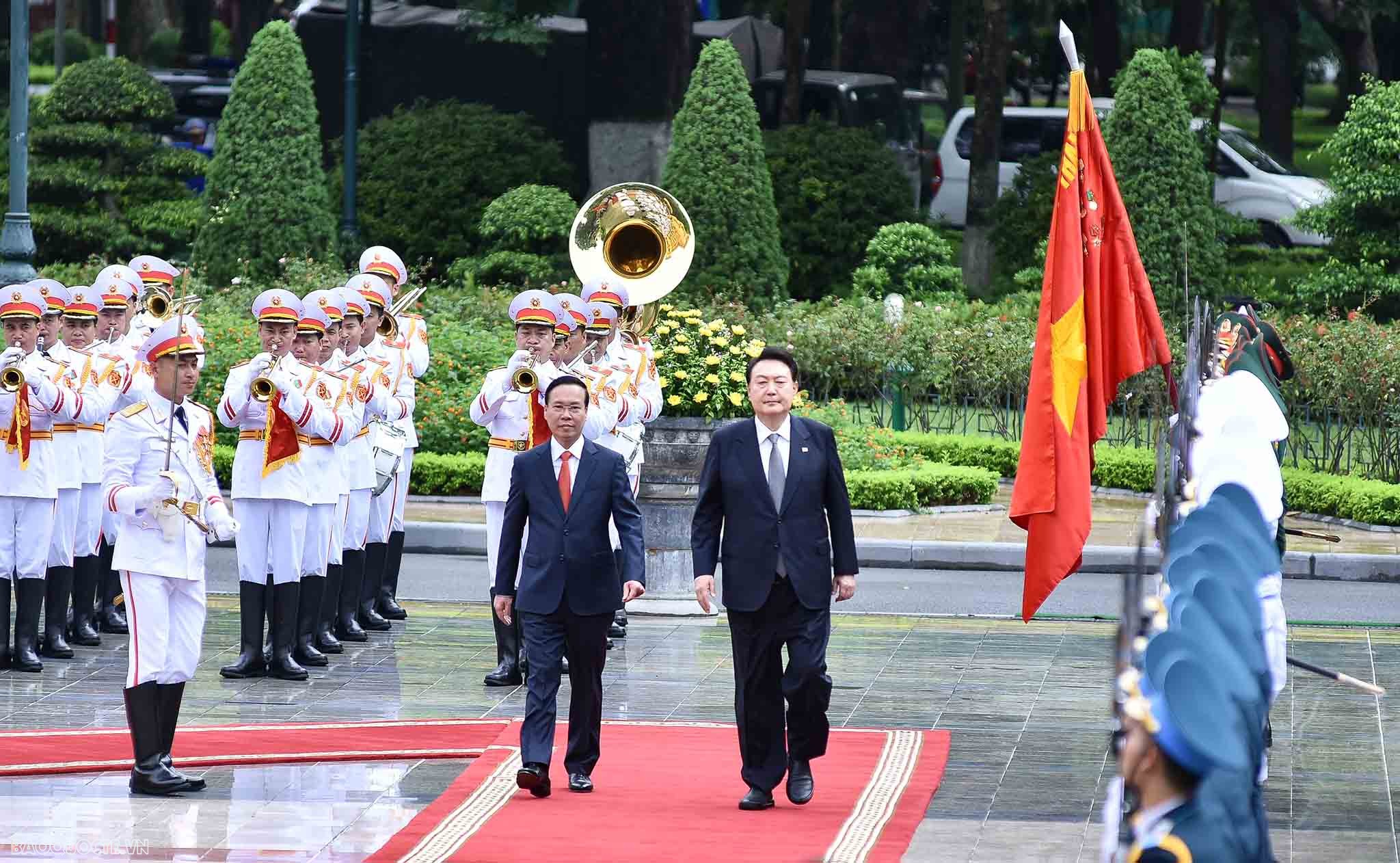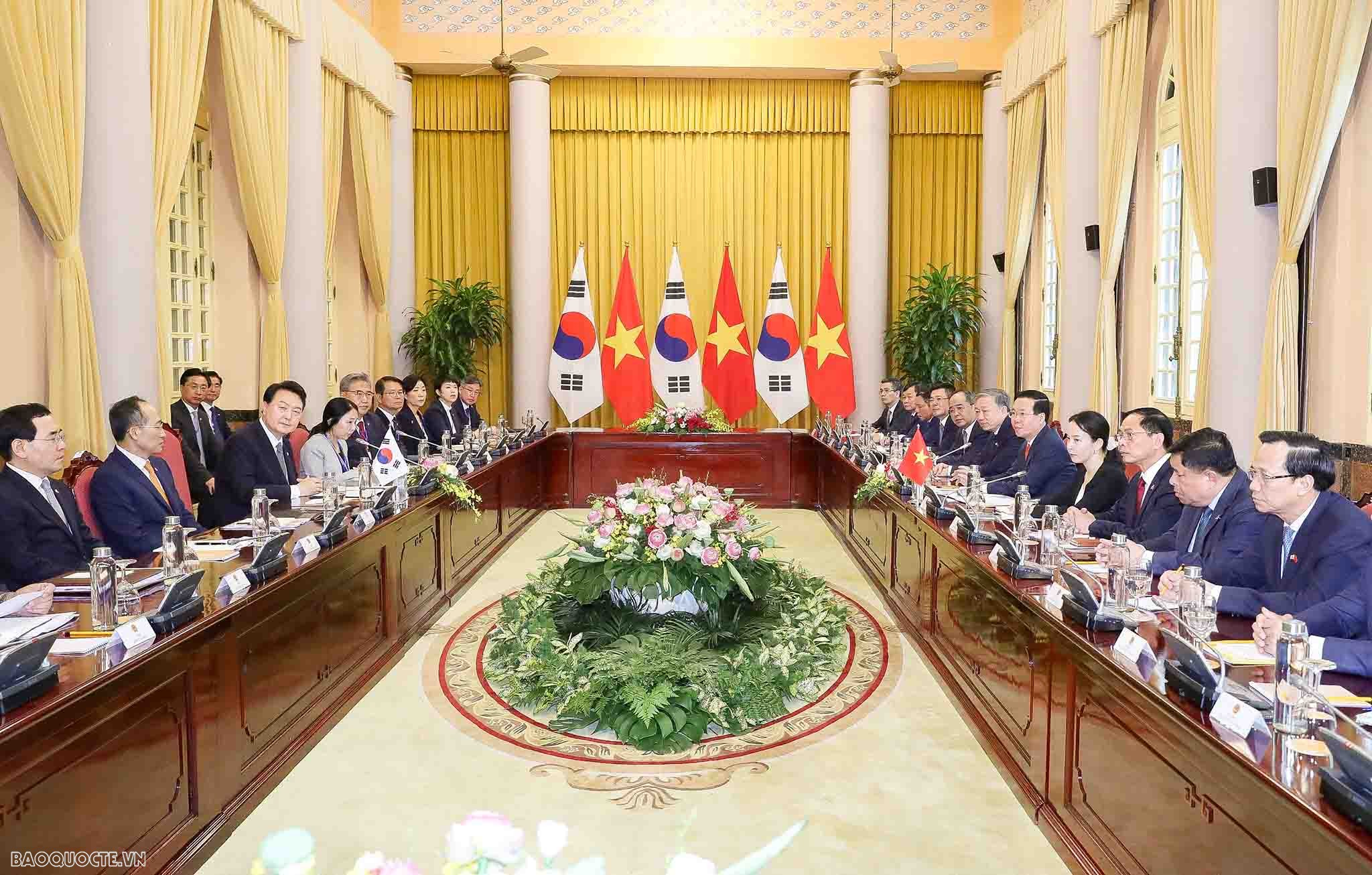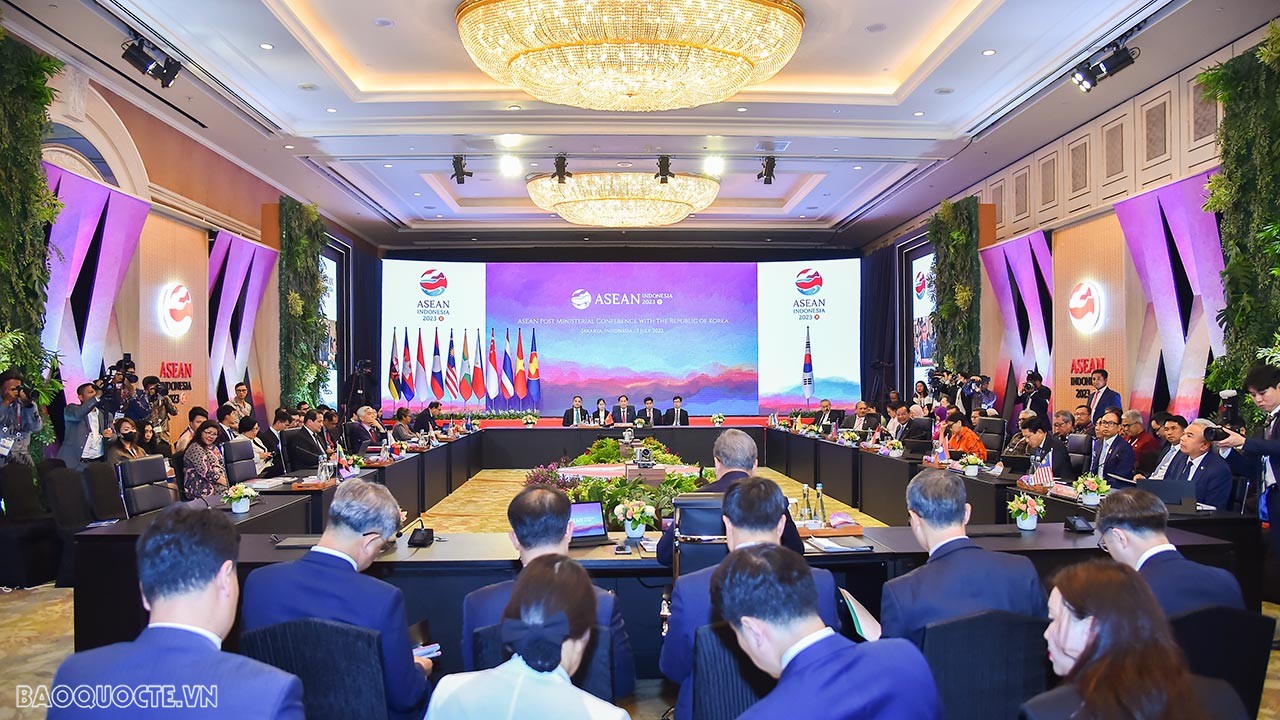
Strengthening Vietnam-RoK Strategic Cooperation under framework of Korea-ASEAN Solidarity Initiative
Latest
 |
| President Vo Van Thuong and Republic of Korea's President Yoon Suk Yeol reviewed the Honor Guard at the welcoming ceremony on June 23, 2023. (Photo: WVR/Nguyen Hong) |
Vietnam and Korea have had a close friendship for long time – from the medieval epoch. This friendship can be expressed with the verses, which Dai Viet’s Ambassador Phung Khac Khoan presented Joseon’s Ambassador Yi Su-kwang (Lee Sugwang) in sixteenth century: “We are all brothers everywhere, helping each other to cross the oceans in the same boat and ride the same carriage”. The spirit of brotherhood and partnership has created a firm foundation for prolonged cooperation and development of two countries up to date.
After more than 30 years (1992) since the Republic of Korea (ROK) and Vietnam officially established diplomatic relations, two countries have become each other's very important partners in many fields, especially economic one. Indeed, ROK currently is Vietnam’s largest direct investor (with total accumulated registered capital of nearly billion 81.6 USD as of the first 6 months of 2023, accounting for 18.2% of the total foreign direct investment - FDI), second largest donor of official development assistance (ODA) and employer of Vietnamese export labor and home of inbound tourists, and ranks third as trading partner. Furthermore, financial penetration of Korean financial institutions is also deepest with the biggest number of commercial banks (10) and securities company (8). Notably, overseas people from the two countries are also numerous, accounting for about 200.000 each.
In the opposite direction, Vietnam is also ROK’s very important economic partner in ASEAN, accounting for 30% of investment and 50% of total trade turnover between ROK and ASEAN. It is no exaggeration to state that ROK is currently one of Vietnam's most dynamic and fastest growing partners since the establishment of diplomatic relations.
In addition to comparative advantages and complementary, competitive advantages of Vietnam, the abovementioned achievements are partly thanks to great efforts of the Governments of the two countries, especially in formulation and implementation of free trade agreements (FTAs) through bilateral and multilateral relations. Among the country’s economic partners, Vietnam and RoK have signed the largest number of FTAs, including ASEAN-RoK FTA (effective in June, 2006), Vietnam- RoK FTA (effective December 2015), Joint FTA with EU (Vietnam-EU FTA (effective 2020), Korea - EU FTA (effective in 2011)), RCEP (came into force in January 2022), and both were the founding members of Indo-Pacific Economic Framework (IPEF) in 2022. And, if South Korea's accession to CPTPP is successful, the two countries will have six FTAs of traditional mode and new standards – a record number of FTAs signed by the two countries states in the world history.
The attained achievements show that Vietnam – RoK partnership has gained effective and fruitful development, bringing practical and specific benefits for people and businesses of the two countries.
A new milestone marked in December 2022, when the two countries officially upgraded their relationship status to Comprehensive Strategic Partnership, opening a new period of cooperation and development. Recently, in June 24 2023, the Presidents of the two countries signed the Action Program to implement the Comprehensive Strategic Partnership. This program comprises of 32 articles/activities, covering political, defense, security, economic areas, of which, major economic-related activities include two-size cooperation in: (1) trade, investment, official development assistance (ODA) and agriculture; (2) science and technology, information and communication, climate change response, natural resource management and infrastructure; (3) cooperation in labor, health and education; (4) cultural, people-to-people exchanges and tourism; and (5) regional and international integration.
In the new context, with new requirements, the two countries need to further promote both the breadth and depth of their comprehensive and strategic relationship, particularly in the economic field.
The ways forwards
It is known that, on 11 November 2022, Republic of Korea initially announced its Strategy for a Free, Peaceful and Prosperous Indo-Pacific Region, confirming its commitment to increase its role and contribution in the region as a Global Pivotal State (GPS). In an effort to put this commitment into action, the ROK launched the Korea-ASEAN Solidarity Initiative (KASI) as a regional policy specifically tailored to ASEAN within the framework of its Indo-Pacific Strategy. It is noteworthy that KASI builds on the existing solid partnership with ASEAN spanning trade, economy and social-cultural areas towards fostering a more comprehensive partnership that encompasses cooperation in security (both traditional and non-traditional) as well as future and emerging areas. Its priority areas are consolidated into eight core lines of effort, which are also aligned with the three key visions of RoK’s Indo-Pacific Strategy.
 |
| President Vo Van Thuong and Republic of Korea's President Yoon Suk Yeol hold talks in Hanoi. (Photo: WVR/Nguyen Hong) |
The Action Program of implementing the partnership covers an array of commitments to deal with main activities and directions that both parties are interested in and have mutual benefits from cooperation and development. Its priorities, activities and directions also largely reflect those of KASI. However, there are a number of activities and directions, particularly, economic ones in the program have not stipulated in detail and/or not clearly stated. It should be noted that, to a fuller extent, KASI’s directions/activities address the emerging issues in Indo-Pacific Region in the new context such as value chain, resilience, digital economy, etc.
First of all, despite the fact that AK FTA largely remains relevant and responsive to evolving regional and global economic landscape, it is necessary to upgrade bilateral relations between RoK and members, particularly Vietnam after nearly 20 of cooperation. In other words, some FTA’s provisions need to be updated and adjusted, taking into account emerging issues such as digital trade, among others. Equally important, under KASI, a special emphasis is placed on fostering a network of cooperation with ASEAN to strengthen economic security amid global and regional economic uncertainties. To this end, the RoK’s crucial role is crucial in diversifying supply chain for greater resilience and stability, including through bilateral Memory of Understandings (MoUs) on supply chain cooperation and strengthened engagement in existing economic dialogues platforms by engaging in the negotiations on trade, supply chain, clean economy and fair economy and by exploring substantive and mutually beneficial projects on digitalization, e-mobility and clean economy, among others. Vietnam should not ignore this opportunity to participate in these activities.
Another important direction Vietnam can also consider is to expand cooperation in future and emerging areas for shared prosperity and development. In order to accelerate post-pandemic recovery, spur economic slowdown and resilient growth, Vietnam and ASEAN should leverage on swifter digital transformation to seize opportunities presented by new digital technologies. KASI envisions increased cooperation with ASEAN in future industries, including in areas of digitalization, e-mobility and smart cities can help Vietnam’s leapfrog into the new digital economy and create new business opportunities. It is also equally important to consider the Capacity Building Project for the Data-driven Smart City Planning (with ROK’s fund of 5.4 million USD for the period of 2023-27) and encourage Korean companies’ participation in smart city projects in Vietnam. In addition, for spurring cooperation for future prosperity, the ROK role should place greater emphasis on future generation exchanges and strengthening women empowerment and TVET (technical and vocational education and training) programs in coming years.
Last but not least direction for RoK and Vietnam is to jointly address and respond to regional and global challenges. In modern globalized and interconnected world, no single country can address regional and global challenges alone, as was clearly demonstrated during the COVID-19 pandemic. In this regards, it is noteworthy that the KASI’s future support to initiate a multi-year project with a view to establishing a center to support ASEAN’s carbon neutrality and green transition efforts, and to work in partnership with the ASEAN Center for Climate Change (ACCC) to strengthen collaboration on climate action.
 |
| AMM-56: ASEAN Foreign Ministers and RoK Foreign Minister Park Jin at the ASEAN-RoK meeting. (Photo: WVR/Tuan Anh) |
It should be recognized that sub-regional cooperation is important for both Vietnam/ASEAN and RoK, particularly with regard to narrowing the development gap in the region. To solve these issues, both sides should explore ways to resume the Mekong-RoK high-level meetings to inject momentum to many of the existing Mekong-ROK projects as well as initiate new projects, especially, to address issues and needs specific to the Mekong region, such as water management, agriculture and rural development, forestry, and environment-related matters through projects funded by the Mekong-Korea Cooperation Fund (MKFC).
In conclusion, Vietnam and RoK have gained the fruitful achievements after three decades or so of cooperation. The recent Comprehensive Strategic Partnership and its following Action Program have laid a solid ground for further and more effective implementation and win-win development for two countries in the new development context.
The recent KASI create new opportunities for ASEAN, especially Vietnam as most important partner of ROK to upgrade FTAs provisions and help Vietnam build up its new hard infrastructure and institutions to deal effectively with new emerging issues. By doing so, it can help Vietnam sustain at least its competitiveness and catch up with more developed economies in the world. As such, Vietnam should consider adjusting and supplementing appropriate supporting activities from KASI to its Action Program when appropriate. Of cause, in order to implement the Action Program effectively and explore more benefits from Vietnam-ROK partnership, Vietnam should substantially improve quality of institutions, especially business environment, enhance it capacity and competitiveness of its economy in term of technology, human resource, innovation, etc., to mitigate the development gap between two countries, especially the digital one. By doing so, both countries can gain more benefits and share prosperity. With these tasks, the role of two governments are very important to build their developmental states and sustainable development. In the Indo-Pacific era, it is expected that the spirit of friendship and partnership will be long-lasting and two countries’ would always be good partners, good friends and good in-law families in a rapidly changing world as Vietnam’s President Vo Van Thuong expressed hope recently.

















